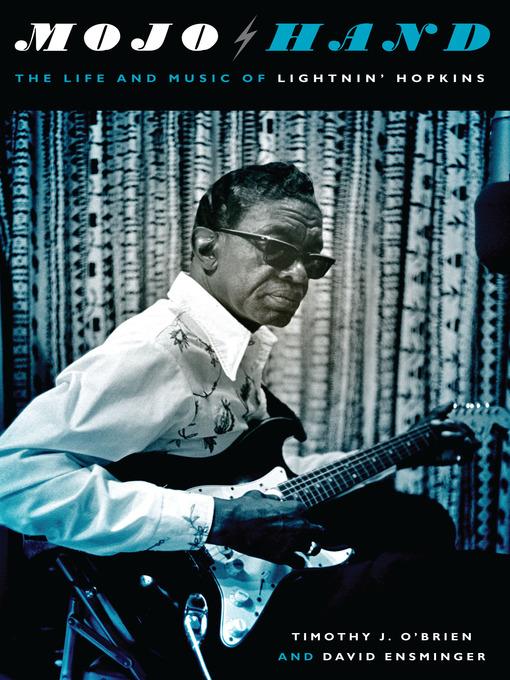
Mojo Hand
The Life and Music of Lightnin' Hopkins
فرمت کتاب
ebook
تاریخ انتشار
2013
شابک
9780292745162
کتاب های مرتبط
- اطلاعات
- نقد و بررسی
- دیدگاه کاربران
نقد و بررسی

February 1, 2013
Unsatisfying biography of the Texas blues original. Journalist Ensminger (Visual Vitriol: The Street Art and Subcultures of the Punk and Hardcore Generation, 2011, etc.) completed the work of his colleague O'Brien after the latter's death in 2011. Singer/guitarist Lightnin' Hopkins' (1912-1982) prolific recorded output revealed one of the most distinctive of blues talents. Born Sam Hopkins into a rural sharecropping family, he began playing guitar at the age of 8, picking up his older brother's instrument. He lit out from home early and was an itinerant musician by his teens, learning at the feet of legends like Blind Lemon Jefferson and Texas Alexander. He settled in Houston's rough Third Ward; the ghetto neighborhood remained his home until he died. The trajectory of Hopkins' career was similar to those of many of his blues contemporaries. After years of local renown, he recorded for a number of independent R&B labels in the late 1940s and '50s. As the '60s turned, he cut records for folk labels catering to the growing white folk-blues market; by late in the decade, he was playing Europe, colleges and the rock ballroom circuit. Hopkins' enormous discography and improvisatory, stream-of-consciousness style led to his lionization before his death. The authors interviewed some 130 subjects and compiled a mountain of research, but Hopkins' essence proves elusive. The authors detail the illiterate and mistrustful musician's affection for liquor, gambling and hard cash, but they fail to plumb his inner life. Too often, the book settles into a frustrating pileup of concert itineraries and reviews, descriptions of recording sessions, nightclub back stories, musings on Southern race relations and long-winded source quotes in need of serious pruning. Hopkins' combative relationship with his longtime producer, manager and agent, Mack McCormick, is the only interpersonal tale spun in any depth. The interior source of his remarkable and poetic gifts remains a mystery. The blues master emerges more as a cliche than a living artist.
COPYRIGHT(2013) Kirkus Reviews, ALL RIGHTS RESERVED.

April 15, 2013
Lightnin' Hopkins was a deeply influential blues musician whose career was filled with staggering highs and lows. After years of toil and a brief prison term in Texas, Hopkins found success in the late 1940s when he was in his 30s. His style of unaccompanied, straight-talking country blues, coupled with a conversational stage presence, led him through a vast recording career and countless live performances that are well documented here by the late O'Brien (history, Univ. of Houston) and Ensminger (Left of the Dial: Conversations with Punk Icons). Hopkins had rather unorthodox business practices for a musician--avoiding managers, agents, etc.--and the details of his career, filtered through a picture of the business at large, paints an interesting portrait of the blues and folk world from the 1940s through the 1980s. VERDICT This is the second biography of Hopkins to appear in the last few years, joining Alan Govenar's 2010 Lightnin' Hopkins: His Life and Blues. While both books are thorough and well researched, this new release, though very informative, is slightly more academic and does not shed dramatic new light on the subject. Recommended only for dedicated fans.--Peter Thornell, Hingham P.L., MA
Copyright 2013 Library Journal, LLC Used with permission.

Starred review from February 1, 2013
Sam Lightnin' Hopkins was determined to escape the toil and misery of sharecropping in Jim Crowera East Texas, and his innate gift for music was the ticket out. He started young, quickly developing his complex, signature style of blues guitar. His ability to play rhythm and lead simultaneously, unhitched intensity and speed, and impishly witty lyrics made him one of the most important bluesmen of the twentieth century, while his refusal to trust record-industry professionals made for a roller-coaster career. Music journalist O'Brien assiduously combed archives public and private and conducted 130 interviews, then Ensminger stepped in to help after O'Brien became ill with the cancer that took his life. The result is a comprehensively detailed and provocative biography brimming with vivid oral history, in which Hopkins comes into focus as a wry, tough, and prickly man, always sharply dressed and happiest playing in small clubs in his Houston neighborhood, gambling, or fishing, even though he thrilled audiences at Carnegie Hall and around the world. Extensive, anecdotal coverage of gigs and recording sessions is balanced with incisive analysis of racial inequities in American society and the music business, Hopkins' tremendous influence on white rock musicians, and how his music built bridges between cultures and people, politics and poetry, humor and humanism. (Reprinted with permission of Booklist, copyright 2013, American Library Association.)

























دیدگاه کاربران